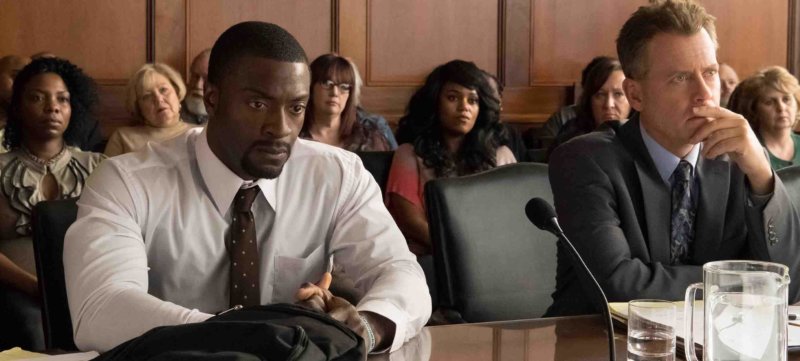NEW YORK (CNS) — Dramas of the falsely accused fighting against a broken legal system are reliably inspiring. With the sports star formula additionally worked in, “Brian Banks” (Bleecker Street) might seem to ace it.
But in the #MeToo era, one watches this earnest courtroom procedural, based on the true story of the football player of the title (Aldis Hodge) who was wrongly imprisoned on a charge of rape, in the devout hope that the filmmakers got all the details right and haven’t tried to manipulate them.
The story, directed by Tom Shadyac from a script by Doug Atchison, is densely plotted and carefully shows all the seemingly insurmountable hurdles Banks faced in his ultimately successfully attempt — with the help of the California Innocence Project, headed by Justin Brooks (Greg Kinnear) — to have his conviction overturned.
A promising high school linebacker who hoped to play for the University of Southern California before joining the NFL, Banks was accused by a classmate, here called Kennisha Rice (Xosha Roquemore). Their hallway encounter, as shown, is merely the clumsy nuzzling of high-schoolers.
An offhand remark from Kennisha to a school security officer results in the rape charge, and her family also successfully sues the school district for $1.5 million. Saddled with an inept lawyer — who tells him that he would be unlikely to be cleared by a mostly white jury — Banks accepts a plea deal, thinking it will result in a brief incarceration and probation.
Instead, he spends five years in prison and, upon release, is both unemployable and unable to play college ball as a registered sex offender with an ankle bracelet. This keeps him virtually shackled both to his past and to a tough parole officer, Mick (Dorian Missick), who is quick to call anytime the device shows Banks to be near a park or where children are present.
His mother, Leomia (Sherri Shepherd), believes in his innocence. And personal trainer Karina (Melanie Liburd) is sympathetic, given her own history with the legal ambiguities of sexual assault charges.
The story shows Banks’ struggle to renounce the additional prison of anger and bitterness, fighting against time before he gets too old to play for a team. He’s helped, while incarcerated, by counselor Jerome Johnson (Morgan Freeman), who gives him James Allen’s 1903 self-help essay, “As a Man Thinketh.”
The popular text takes its title from the King James version of Proverbs 23:7, “For as he thinketh in his heart, so is he,” and espouses the power of unlocking positive thoughts to overcome despair. The story veers away from faith-based elements, though, given its concentration on labyrinthine legal complexities.
A nuanced portrayal of the accuser keeps the character from falling into a stereotype, But the moments when she “friends” Banks on Facebook, agrees to meet him, and he later gets a friend to record her “confession,” are as jarring to the audience as they must have been to him.
“Brian Banks” is not as clearly told as it should have been. Yet it is effective at showing the power of unwavering hope.
The film contains mature themes, including sexual assault, a few sexual references, at least one use of profanity and fleeting rough language. The Catholic News Service classification is A-III — adults. The Motion Picture Association of America rating is PG-13 — parents strongly cautioned. Some material may be inappropriate for children under 13.
Copyright ©2019 Catholic News Service/U.S. Conference of Catholic Bishops.


